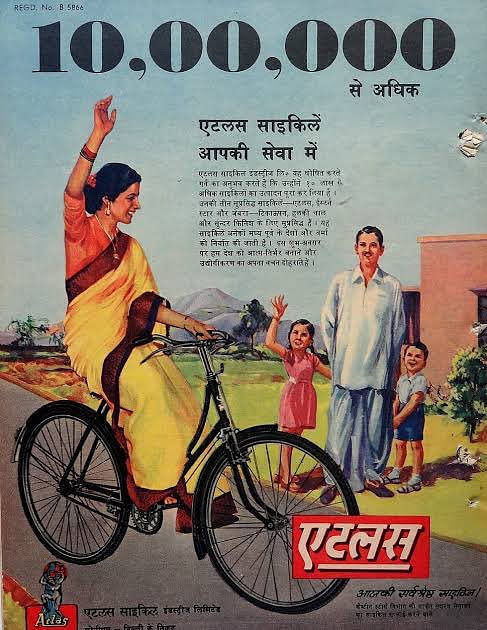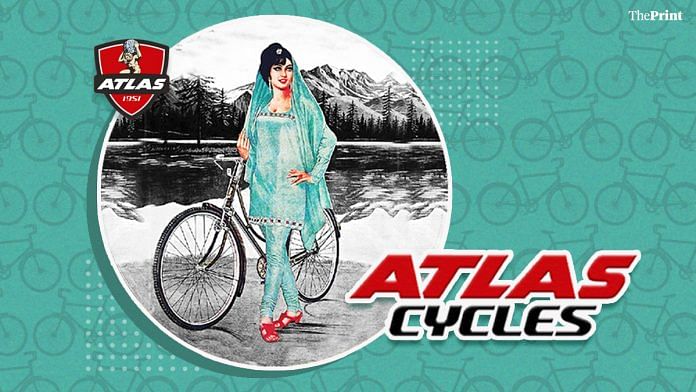For many Indians, childhood meant an evening ritual of a ‘galli ka chakkar’ with their friends on their trusty Atlas Cycle. But the makers of what is possibly every Indian’s first set of wheels shut shop on 3 June 2020, ironically, on a day that is celebrated as World Bicycle Day.
After 70 years of being not just in the business but in the fabric of India’s identity, the company was forced to shut its last manufacturing unit in Sahibabad, Uttar Pradesh, when it could no longer afford to run operations. While the company had been under financial pressure for a while, the Covid-19 pandemic and lockdown was the last nail in the coffin.
A notice on the factory gate greeted the staff: “We are facing difficulty in arranging funds for our day to- day operations. We are also unable to buy raw material. In these conditions, the management is not in a position to operate the factory.”
The news broke many hearts. Many took to the internet to grieve for how a piece of their childhood was being taken away. Sunita Narain, an environmentalist and cycling enthusiast, said, “I used to ride an Atlas cycle in my childhood. It was synonymous with bicycles. We want more cycles on the roads so this news is really tragic.”
Also read: Planet M — brand that changed how Indians experienced music in new millennium
Quality wheels at reasonable prices
Atlas Cycles was founded in 1950 by Janki Das Kapur, a man with a singular dream, to build quality cycles at affordable prices for his fellow Indians. From his modest beginnings, of building cycles in a shed in Sonepat, he set up his first factory complex, a 25-acre affair, in just a year. In the first year itself, the plant rolled out 12,000 cycles. Under his leadership, Atlas Cycles emerged as India’s largest cycle manufacturer by 1965.
Janki Das Kapur gave up the reins for his son Jai Dev, who worked in tandem with joint presidents Girish Kapur and Gautam Kapur. Soon, Atlas became the official supplier of bicycles to the 1982 Asian Games in New Delhi. After it expanded its production overseas, the company produced over 40 lakh bicycles each year.
In 2003, Girish Kapur had revealed that the company enjoyed 28 per cent of the bicycle market in India. He added, “Atlas is the only Indian bicycle company with a complete manufacturing unit whose in-house research and development unit has been recognised by the department of scientific and industrial research, Union Ministry of Science and Technology. The company has a modern paint application unit at Sahibabad.”
The company philosophy of ‘employee empowerment’ has gone a long way, so much so that even former Atlas employees are heartbroken by the closure. Ashish Nagpal, who worked with the company for 19 years and now owns a cycling club called Cycle Sutra, said, “Having worked with Atlas as a brand head, the news was extremely painful and disheartening and gave me sleepless nights.”
Also read: Boroline — the cure-all that is stuck in time but still brings joy, especially to Bengalis
From utility-driven to rebel bike, women in the front seat
The brand’s logo symbolises Greek Titan Atlas holding up the world on his shoulders. The company’s website reveals this is because “Atlas assimilates in itself aspirations of the millions in their progress and transition through various phases in their lives.”
The advertisement campaigns of Atlas Cycles were vital in establishing the brand as a household name. One of the initial posters for the cycle promoted a utility serving product that came at an affordable price.
Moreover, an overarching and rather refreshing theme in the first few advertisements was that they promoted women riding these cycles. Not only that, these women were clad in saris, putting paid simultaneously to the stereotype of women not being sporty and of saris being a hindrance to such activities.

As the brand continued to build its name over the years, the focus of its campaign strategy changed. From establishing itself as a utility-driven brand that was affordable to all, it switched to promoting itself as the new adventure sport bike on the block.
Tapping into the spirit of a rebel without a cause, Atlas launched the Rebel cycle. The ad features a young boy who, fed up of arguing with his father, takes a long ride across different terrains on his Rebel bike.
Then came the breakthrough bike also known as Atlas Concorde, which came with 10 gears, something that was unheard of until then.
With many new brands of wheels coming into the market, Atlas had to up its advertising game, which it did by jumping on the brand ambassador bandwagon. In 2004, it signed actor Suniel Shetty and tennis champ Sania Mirza as brand ambassadors, and allocated a separate budget of Rs 7 to 8 crores for this campaign.
Also read: Chandrakanta, the show in which Irrfan won hearts four lines at a time
The Atlas will ride back
While this shutdown was a shock to many consumers, it had been a long time coming. The company first started making losses in 2014, which resulted in its Malanpur plant in Madhya Pradesh being shut. The company continued to record losses four years later, forcing its Sonepat plant shut in February 2018. And now, it has shut its last factory and laid off around 700 employees.
But staying true to the spirit of Atlas, company CEO NP Singh Rana is confident that the closure and layoffs are temporary, and that the company will resume production once it is able to raise Rs 50 crores after selling surplus land.
Rana said, “Demand is not a problem, the market is very good. We have a very strong dealer and supplier base. We are a 70-year-old brand and very well accepted in the market. We will bounce back.”
The wheels for Atlas Cycles’ future have already been set in motion. Rana has explained that an application seeking to sell the surplus land has already been filed at the National Company Law Tribunal. He remains confident of the company’s future, saying, “Once we get the permission, we will sell off our surplus land and the surplus land money will be much higher to pay back all the dues of suppliers and our people and we will resume production.”
Like our childhood’s galli ka chakkar, here’s hoping Atlas Cycles comes riding right back into India’s life – especially, given climate crisis and a pandemic, because eco-friendly wheels are truly the only way to move ahead.
Also read: Rola Cola is back, thanks to the power of nostalgia, social media and a sweet price-point



